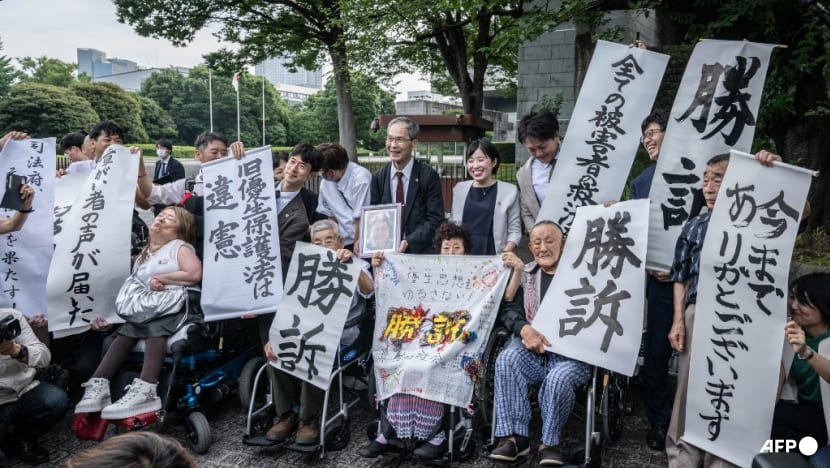- Joined
- Aug 29, 2008
- Messages
- 27,430
- Points
- 113
Japan's top court rules forced sterilisation law unconstitutional

Victims of forced sterilisation under a now-defunct eugenics law, celebrate with lawyers and supporters outside of the Supreme Court of Japan in Tokyo on Jul 3, 2024. (Photo: AFP/Yuichi Yamazaki)
03 Jul 2024 03:48PM (Updated: 03 Jul 2024 04:48PM)
TOKYO: Japan's top court ruled on Wednesday (Jul 3) that a defunct eugenics law under which thousands of people were forcibly sterilised between 1948 and 1996 was unconstitutional.
The Supreme Court also declared that a 20-year statute of limitations could not be applied, paving the way for compensation claims from victims after years of legal battles.
"For the state to evade responsibility for damages payments would be extremely unfair and unjust, and absolutely intolerable," the court in Tokyo said.
Japan's government acknowledges that around 16,500 people were forcibly sterilised under the law that aimed to "prevent the generation of poor quality descendants".
An additional 8,500 people were sterilised with their consent, although lawyers say even those cases were likely "de facto forced" because of the pressure individuals faced.
A 1953 government notice said physical restraint, anaesthesia and even "deception" could be used for the operations.
"There are people who couldn't be here today. There are those who died as well. I want to visit the grave of my parents and tell them we've won," victim Saburo Kita, who uses a pseudonym, told reporters after the ruling.
Kita was convinced to undergo a vasectomy when he was 14 at a facility housing troubled children. He only told his wife what had happened shortly before she died in 2013.
"But a complete resolution of this issue hasn't been realised yet. Together with lawyers, I will continue to fight," said Kita, one of several victims who celebrated outside the court, some in wheelchairs.
APOLOGY
The number of operations in Japan slowed to a trickle in the 1980s and 1990s before the law was scrapped in 1996.That dark history was thrust back under the spotlight in 2018 when a woman in her 60s sued the government over a procedure she had undergone at age 15, opening the floodgates for similar lawsuits.
The government, for its part, "wholeheartedly" apologised after legislation was passed in 2019 stipulating a lump-sum payment of ¥3.2 million (around US$20,000 today) per victim.
However, survivors say that was too little to match the severity of their suffering and took their fight to court.
Regional courts have mostly agreed in recent years that the eugenics law constituted a violation of Japan's constitution.
However, judges have been divided on whether claims are valid beyond the 20-year statute of limitations.
Some ordered the state to pay damages but others dismissed cases, saying the window for pursuing damages had closed.
"We will pay damages based on the verdict that was finalised today," government spokesman Yoshimasa Hayashi said.
"The relevant ministries and agencies will examine the content of the court decision and consider appropriate measures to be taken," Hayashi told reporters.
A group of victims said on Wednesday it "wholeheartedly" welcomed the ruling.
"We cannot forgive the irresponsibility of the government and its lack of human rights awareness, as well as the fact that what is now described as the biggest human rights violation in Japan's post-war history was left unaddressed for such a long time," the group said in a statement.
Lawyer Koji Niizato said it was "the best ruling we could have hoped for".
"Victims of the eugenics law put up a wonderful fight, one that influenced the Supreme Court and changed society," Niizato said.
Source: AFP/ec
